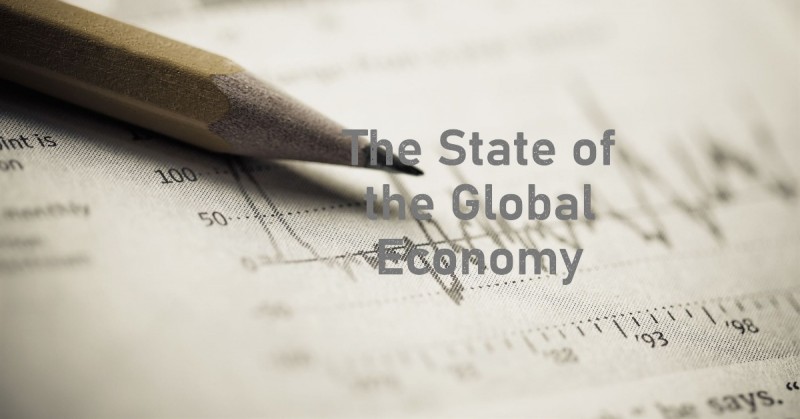
In today's interconnected world, the state of the global economy holds significant importance. Economic indicators such as GDP growth, inflation, and unemployment play a crucial role in shaping the trajectory of nations and regions. This article aims to provide a comprehensive overview of the current state of the global economy, highlighting the latest economic indicators and discussing their impact on countries and regions worldwide.
The global economy refers to the interconnectedness of various national economies, trade systems, financial markets, and the flow of goods, services, and capital across borders. Understanding the global economy is crucial for policymakers, businesses, and individuals alike, as it affects employment rates, investment opportunities, and overall living standards.
2.1 Gross Domestic Product (GDP) Growth
Gross Domestic Product (GDP) is a fundamental measure of economic activity within a country. It represents the total value of goods and services produced within a specific time frame. GDP growth indicates the rate at which an economy is expanding or contracting. A positive GDP growth rate signifies economic progress, while negative growth indicates a recession.
2.2 Inflation Rate
Inflation is the gradual increase in the prices of goods and services over time. It erodes the purchasing power of money and impacts consumer spending habits. Central banks aim to maintain a stable inflation rate to ensure price stability and sustainable economic growth. A moderate inflation rate encourages investment and spending, while high inflation can lead to economic instability.
2.3 Unemployment Rate
The unemployment rate reflects the percentage of the labor force that is actively seeking employment but unable to find work. Low unemployment rates signify a robust economy with ample job opportunities, while high rates indicate a slowdown or recession. Governments and policymakers implement measures to stimulate job creation and reduce unemployment.
The state of the global economy has far-reaching implications for countries and regions worldwide. Let's explore its impact from two different perspectives.
3.1 Impact on Developing Nations
Developing nations often rely on international trade and foreign investments for economic growth. The global economy plays a vital role in shaping their economic prospects. Changes in global demand, trade policies, or commodity prices can significantly impact developing nations, affecting their exports, revenue, and overall economic stability.
3.2 Influence on Developed Nations
Even developed nations are not immune to the effects of the global economy. Interconnected financial markets, multinational corporations, and international trade make developed economies vulnerable to global economic fluctuations. Economic crises in one part of the world can quickly spread and affect developed nations, leading to market volatility and economic slowdowns.
The state of the global economy varies across regions. Let's take a closer look at how different parts of the world are affected.
4.1 North America
North America, comprising the United States, Canada, and Mexico, has a significant influence on the global economy. The region's economic indicators, such as the U.S. GDP growth rate, impact global financial markets and trade flows. Developments in North America often have a ripple effect on other regions worldwide.
4.2 Europe
Europe, with its diverse mix of developed and developing economies, plays a crucial role in the global economy. The European Union (EU) member states collaborate on trade, monetary policy, and economic integration. The economic performance of European countries, such as Germany, France, and the United Kingdom, influences the overall state of the global economy.
4.3 Asia
Asia, home to emerging economic powerhouses such as China and India, has experienced significant growth in recent decades. The region's economic indicators, including GDP growth rates and trade volumes, have a substantial impact on the global economy. Asia's manufacturing capabilities, technological advancements, and consumer markets shape the economic landscape on a global scale.
4.4 Latin America
Latin American countries face unique economic challenges and opportunities. Factors such as commodity prices, political stability, and foreign investments impact the region's economic performance. The state of the global economy directly affects Latin American countries, as they rely on exports of commodities such as oil, minerals, and agricultural products.
4.5 Africa
Africa, with its vast natural resources and a growing consumer market, holds immense economic potential. However, the continent faces developmental challenges, including infrastructure gaps and political instability. The global economy's performance influences Africa's economic progress, investment inflows, and trade opportunities.
A globalized economy presents both challenges and opportunities for nations and regions. The interdependence of economies means that economic shocks in one part of the world can quickly transmit to others. However, globalization also opens doors for increased trade, technological advancements, and cross-cultural collaborations, fostering economic growth and innovation.
Conclusion
The state of the global economy is a complex and ever-evolving subject. Economic indicators such as GDP growth, inflation, and unemployment provide insights into the overall health and performance of economies worldwide. Understanding the global economy's dynamics and its impact on different countries and regions is essential for policymakers, businesses, and individuals navigating an interconnected world.
Bigger, Better, and Unbelievable: 5 Enormous Ships That Put the Titanic to Shame
CEO: World Defence Show will grow as the number of participating nations rises.